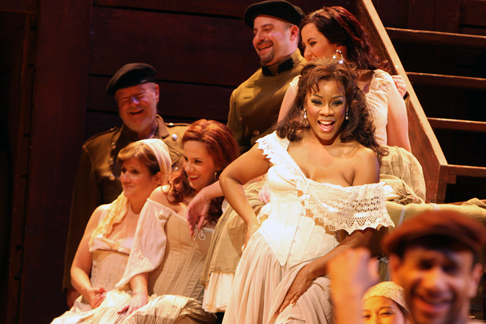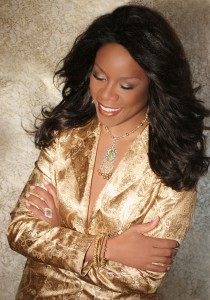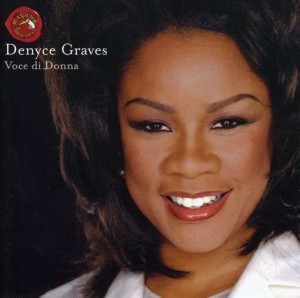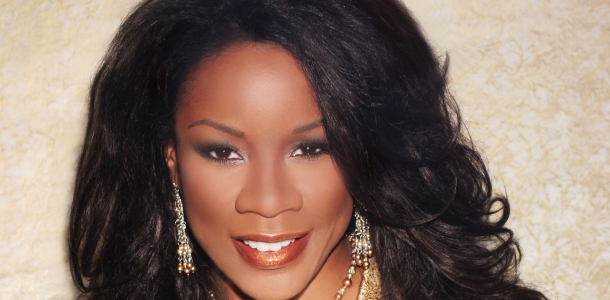by duane wells
It is not ordinary for an opera singer to experience a rise as meteoric as that of Denyce Graves, but, then again, there is nothing quite ordinary about the woman herself. No ordinary diva…No ordinary mezzo-soprano…No ordinary human being…Denyce Graves is, in a word, extraordinary. An elegant and refined creature marked with stupefying vocal capabilities and disconcerting humility,Graves is dramatically reconstructing the face of divadom for the next century. Heralded by critics around the world as the definitive “Carmen” in Bizet’s tale of a sexually-charged gypsy girl who is unable to love and lauded as one of the most gifted mezzo-sopranos on the opera circuit today, Denyce Graves stands squarely on the precipice of superstardom.
Review after review from New York to Vienna now boldly proclaim what so many have known for a long time…Denyce Graves is opera’s brightest new star. USA Today has singled her out as one of “the singers most likely to be [an] operatic superstar of the 21st century” and Glamour Magazine thought it fitting to name her one of 1997’s 10 Women of the Year. Internationally-renowned tenor, Placido Domingo, has made her both his Carmen and Dalila of choice the world over, while BMG Classics/RCA Red Seal has made her their choice for an exclusive recording contract that will produce beautiful music well into the next millennium. Oh and, just in case you were thinking of trying to book Ms. Graves for an engagement, you’ll have lots of time to plan because she’s planned recitals through 2002. Not bad for an awkward, skinny, unpopular little girl from one of the poorest neighborhoods in Washington,D.C.
To understand the accolades that follow Denyce Graves as effortlessly as the trains of her well-crafted couture gowns, one need only hear that voice…the lush, broad soprano that can soar to breathtaking heights or slip down to heart-wrenching depths you had not previously known existed. The sheer magnitude of her talent is mind-boggling, but what is even more mind-boggling is the woman behind the voice. Graves, the woman is so much more than the sum of her talents or her success. She is one of those rare women whose arrival is as prescient as her journey.
On the surface, Graves’ story bears all the cliches that generally accompany a rags-to-riches story. Abandoned by her father before she was even a year old, raised by a strict single Pentecostal mother who forbade her children to listen to anything other than religious music, treated as an outcast by her peers because of her love of poetry and classical music, mentored by a concerned instructor who saw not only her talent, but her determination, so poor throughout her college years at Oberlin that she had to scrub pots and bathroom floors to survive, faced with a potentially career-ending thyroid problem at the very brink of being discovered and forced to give up singing for a while and become a secretary, Graves’ ascension like a phoenix from the ash at the Houston Opera is nothing short of astonishing. That she also managed to catch the attention of Placido Domingo in the process only adds luster to the fairy tale. It’s pretty amazing stuff to be sure. The stuff of which blockbuster movies-of-the-week are made. But what’s more interesting about Graves is how, in spite of all that has befallen her in the ten years she’s been in the business, she remains so grounded…so pure. More specifically, how she has scaled the heights in an elite art form without becoming elitist herself.
 In person, Graves is striking in every way. Dressed simply in navy blue silk palazzo pants, a pale yellow cotton oxford and simple sandals, Graves exudes an innate elegance yet remains extremely approachable. While most certainly a diva, she is neither grand nor pretentious. Graves is a woman so down-to-earth that she interrupts our interview several times to encourage me to eat, even offering me some of her Caesar salad at one point (For the record, I was dieting). Were it not for her mellifluous voice, rich with inflections of French, German and Italian (all of which she speaks), one would hardly think that Graves is the woman who, at the tender age of 34, has not only claimed Carmen as her own, but wowed audiences around the world in a host of other roles. This is particularly significant because Graves thrives in a world where larger than life egos are not only standard, but expected (think Maria Callas).
In person, Graves is striking in every way. Dressed simply in navy blue silk palazzo pants, a pale yellow cotton oxford and simple sandals, Graves exudes an innate elegance yet remains extremely approachable. While most certainly a diva, she is neither grand nor pretentious. Graves is a woman so down-to-earth that she interrupts our interview several times to encourage me to eat, even offering me some of her Caesar salad at one point (For the record, I was dieting). Were it not for her mellifluous voice, rich with inflections of French, German and Italian (all of which she speaks), one would hardly think that Graves is the woman who, at the tender age of 34, has not only claimed Carmen as her own, but wowed audiences around the world in a host of other roles. This is particularly significant because Graves thrives in a world where larger than life egos are not only standard, but expected (think Maria Callas).
When asked how she maintains her footing in the heady world of opera, Denyce is quick and blunt with her response. “For me, it’s conscious,” she says without missing a beat. “It’s also home training. My mom used to always teach us to respect everybody. David [her husband] and I have embraced the ideology that each person’s spiritual path is as glorious as the next. It doesn’t matter what you do in your life. Each being here has equal value.”
“I’m a very sensitive person,” she continues. “And my feelings are hurt very easily. I really have no tolerance when people are mean and rude and that really hurts me as a person…I take issue when people are unkind. This business has traditionally had the air of elitism. I’m opposed to that.”
Not quite the kind of attitude that one would expect from a woman who has performed at the White House twice and enthralled scores of wealthy opera patrons around the globe, but Graves, along with her husband of the last 7 years, David Perry, is crafting a bold new model for a career in opera. A model which borrows heavily from successful models in popular music.
“We have been entrepreneurial for many years now,” she says proudly. “Some years ago, I was complaining to my husband about how unfair things were and he said to me, `Denyce, you’re either going to complain about it or you’re going to do something to change it.’ That’s when Carmen Productions was born.”
 Carmen Productions, the production company formed by Denyce and her husband, has, thus far, produced Denyce Graves: A Cathedral Christmas, which airs annually on PBS and Black Entertainment Television, and Angels Watching Over Me, a recording of spirituals co-produced with NPR Classics. In the works is Portrait of an American Diva, a documentary about the singer’s life as well as an autobiographical book chronicling Graves’ rise to operatic stardom.
Carmen Productions, the production company formed by Denyce and her husband, has, thus far, produced Denyce Graves: A Cathedral Christmas, which airs annually on PBS and Black Entertainment Television, and Angels Watching Over Me, a recording of spirituals co-produced with NPR Classics. In the works is Portrait of an American Diva, a documentary about the singer’s life as well as an autobiographical book chronicling Graves’ rise to operatic stardom.
“One has to become business-minded,” Graves offers. “Because of that we decided to stretch outside the opera circle. After the success of The Three Tenors [Pavarotti, Domingo, Carreras] and with some of the pop artists starting to do classical things, we thought why don’t we try to break out of this mold and go broader. That is where the movie, the book and all these irons that we have in the fire began.”
Fully aware of the vagaries of instant notoriety and fame, Graves acknowledges the challenges that lie ahead of her. “One has to also think…that there will come a day when the phone will stop ringing and you have to prepare for that. Those are the kinds of things they don’t teach in the conservatory. There’s always another beautiful, bright mezzo around the corner, so you have to stay on top of it. That’s why I have so much respect for [Placido] Domingo and those guys because they have been doing it for thirty years at a high level of excellence. That’s what makes someone great.”
After a hard-fought climb to the top of her profession,Gravesis clearly intent upon staying there. “We are working all the time and always trying to move forward.” She says with a laugh when I question her about her hectic schedule. “I see that there’s a tremendous amount of work to be done and there is so much that I want to do. I don’t really feel that I’ve arrived. I feel that I’m en route. I’m still working my way there…I think the work is ongoing and I’m definitely a work in progress.”
And what work it is. Determined to give her very best, Graves spends at least five months, and often more, preparing for a new role going through what she describes as a “painstaking and arduous process”. Given her propensity to take on new roles that will boldly expand her rapidly growing repertoire, this is certainly an almost constant exercise for Graves, who seems to have something akin to fearlessness when it comes to taking on new roles. However, while she is fearless,Gravesis also cautious not to push herself too far.
“I’m not panicky. I don’t feel like I have to try to do everything. I learn the material when I learn the material and perform it when the time is right. When it’s right for the voice and when it’s right for me. I have had lots of offers to do Verdi and Wagner and we say ‘No…No…No…Not right now.’” She says.
 At a point when her career couldn’t get much hotter,Graves has the carriage and confidence of woman who’s been through hell and walked out the other side with a story to tell. However, despite all of her present success and the seemingly endless stream of offers,Graves continues to see her share of pitfalls and challenges.
At a point when her career couldn’t get much hotter,Graves has the carriage and confidence of woman who’s been through hell and walked out the other side with a story to tell. However, despite all of her present success and the seemingly endless stream of offers,Graves continues to see her share of pitfalls and challenges.
“Every day I’m challenged,” She offers as she gingerly cuts into her grilled chicken breast. “So often you stand alone…So many times you will find that you have to stand alone against conductors, against directors, against the establishment, against what people perceive as what they want to see you doing or what other people think you should be doing…all of that stuff can work it’s way in and become poisonous or cancerous on some levels. It really takes knowing your instrument, having a good relationship with a voice teacher or coach and just going for it.”
“This particular profession is steeped in protocol and tradition. It is not the wish of everyone that I work with and everyone that I have to work with that I’m there. That’s for sure! In fact, there are those who work very hard to prevent any good from happening,” she continues.
In order to deal with those who work against her,Graves reaches back to the spirituality that was such a part of her formative years.
“My mother used to say to me, `Whenever something bad happens to you, that’s just Satan getting in the way, trying to stop something good from happening, that’s all. Just know that something good is about to happen and that Satan is trying to block that.’ That has been the source of a lot of my strength. I also get a lot of strength from the women that have come before me. I’m here because of the blood of those women. I acknowledge that.”
The time is drawing nigh for Graves’ rehearsal with the Los Angeles Opera where she will, once again, join Placido Domingo for several performances of Samson and Dalila. As our interview winds down, I ask her what she would want people to say about her at the end of the day. Being the homegrown diva that she is, she says, after the briefest of pauses, “That I’m a good person who values life and who appreciates life.” Period.
Not even a mention of her dominating the role of Carmen, not that she was the pre-eminent mezzo-soprano of her day, not even that she was a spectacularly gifted singer whose voice changed people’s lives with its majesty. Just “a good person”. True to form, Denyce Graves further illustrates with this final remark that she is the woman next door, with the voice and generosity of spirit that is larger than life. A true diva for the new millennium.


